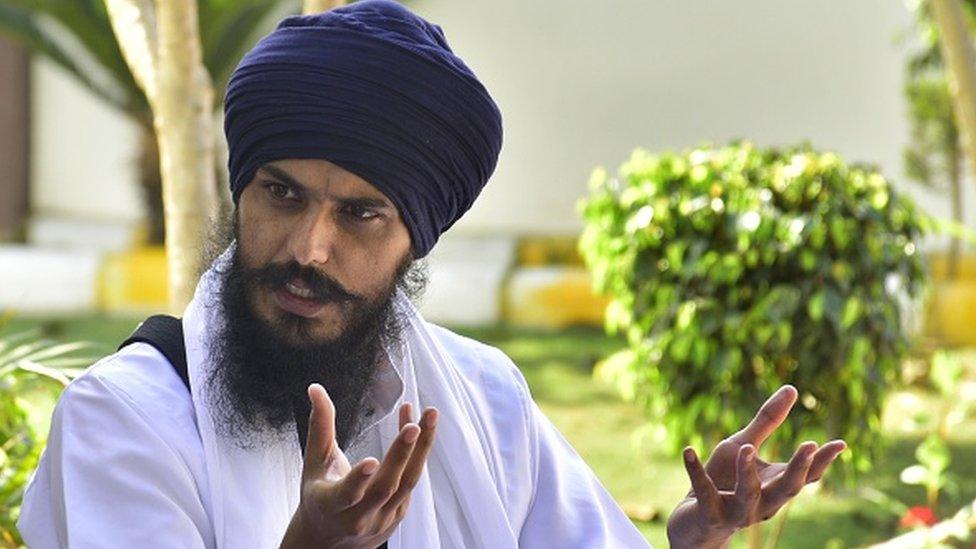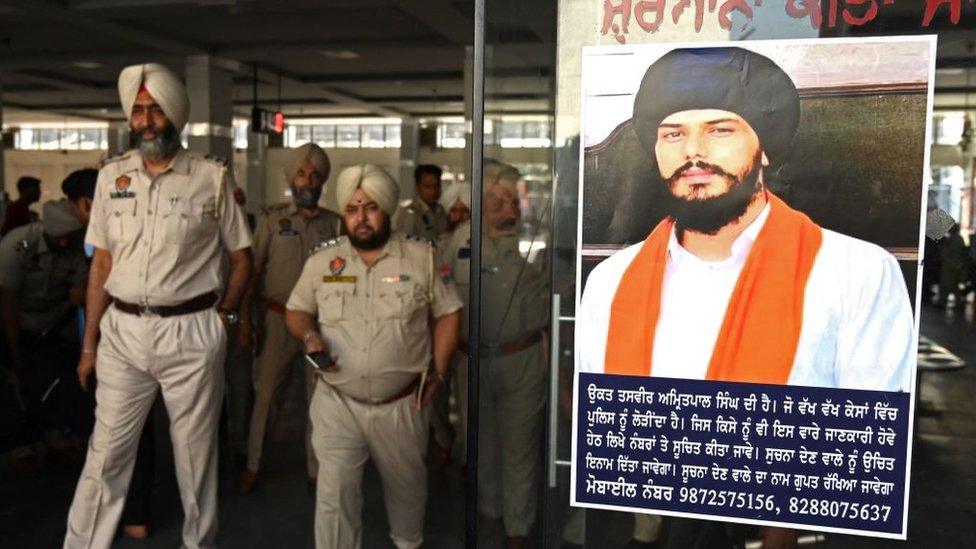Amritpal Singh: Sikh separatist arrested after weeks on the run
- Published

Amritpal Singh had been on the run since 18 March
Self-styled preacher Amritpal Singh, whose calls for Sikh independence riled India's authorities, has been arrested in Punjab state.
The 30-year-old had been on the run for more than a month after evading arrest in Punjab on 18 March.
He and his supporters have been accused of attempted murder and attacking police officials.
Punjab Police officials confirmed news of the arrest on Twitter and also appealed for peace.
Mr Singh was arrested from Rode village in Punjab's Moga district at around 6.45am on Sunday, the state's inspector general Sukhchain Singh Gill said in a press conference.
He has been arrested under the stringent National Security Act (NSA), which allows for individuals to be detained without being charged for up to a year. He will be taken to the high-security Dibrugarh jail in Assam state, where some of his supporters have been kept.
Mr Singh shot to prominence in February after hundreds of his supporters stormed a police station, demanding the release of an arrested aide.
His campaign brought back memories from the 1980s of a separatist insurgency and subsequent crackdown in Punjab in which thousands of people were killed.

Mr Singh's disappearance had sparked a massive manhunt
Mr Singh, who says he supports the Khalistan movement for a separate Sikh homeland, claims to draw inspiration from Jarnail Singh Bhindranwale, a preacher accused by the Indian government of leading an armed insurgency in the 1980s. Bhindranwale was killed in the Indian army's storming of the Golden Temple, the holiest shrine in the Sikh religion, in 1984.
The manhunt for Mr Singh spanned several parts of northern India, including the capital Delhi and the states of Punjab, Haryana, Uttar Pradesh and Uttarakhand. Nepal had also put him on its surveillance list at India's request.
Police first attempted to arrest Mr Singh on 18 March - thousands of personnel were deployed and traffic blockades were set up across the state to check vehicles.
But he escaped in a dramatic car chase which was live-streamed by some of his associates. Within hours of Mr Singh's escape, authorities blocked internet services in Punjab - where 27 million people live - restricted the movement of people, and arrested hundreds of Mr Singh's supporters. Many of them were later released.
Akal Takht, the supreme temporal seat of Sikhs, had asked Mr Singh to surrender to the police and co-operate with their investigation.
After the crackdown, however, it also questioned the government's arrests and detentions of people for their alleged support of Mr Singh and for Khalistan.
Sikh groups in Canada held widespread protests against the government action in Punjab. Protests were also held outside the Indian High Commission in London, where demonstrators removed the Indian flag. India had strongly condemned the incident and summoned the UK's deputy high commissioner in New Delhi to register its protest.
In San Francisco, pro-Khalistan supporters vandalised the Indian consulate, calling for Mr Singh to be freed.
A couple of weeks after his arrest, Mr Singh had released a video, external from an undisclosed location, where he termed the crackdown as an "attack on the Sikh community". He had also termed as "unfair" the invocation of the NSA against him and his supporters.
Who is Amritpal Singh?
Not much is known about Mr Singh's early years. A resident of Jallupur Khera in Punjab's Amritsar district, he moved to Dubai in 2012 to join his family's transport business.
His LinkedIn profile says he has a mechanical engineering degree from a university in Punjab and that he worked as an "operational manager" at a cargo company.
For many years, reports say, his popularity was restricted to social media where his views on Sikh unity and statehood found plenty of resonance.
In August last year, he travelled to India from Dubai, looking like a devout, practising Sikh - visibly different from old photos in which his hair and beard were neatly trimmed.
A month later, Mr Singh was appointed head of Waris Punjab De (Heirs of Punjab), an organisation formed by Deep Sidhu, an actor and activist who was arrested in connection with violence during a protest held by farmers - he died in a car accident last year.
The ceremony, which was attended by thousands of people, was held in Rode, which is also the ancestral village of Bhindranwale.
BBC News India is now on YouTube. Click here, external to subscribe and watch our documentaries, explainers and features.

Read more India stories from the BBC:
